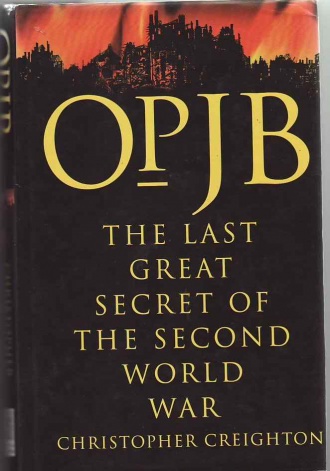Difference between revisions of "Op JB"
(Add amazon link) |
(Appendix) |
||
| Line 14: | Line 14: | ||
# A poorly photocopied 1954 letter from [[Winston Churchill]] instructing him to say nothing about the operation until Churchill is dead. | # A poorly photocopied 1954 letter from [[Winston Churchill]] instructing him to say nothing about the operation until Churchill is dead. | ||
# A 1963 letter by Ian Fleming confirming the basic account. | # A 1963 letter by Ian Fleming confirming the basic account. | ||
| + | |||
| + | ===Appendix=== | ||
| + | Op JB has one appendix which deals with an unrelated event. In it, Ainsworth-Davis describes how he destroyed the Dutch submarine K-XVII after they stumbled across the Japanese fleet heading for Hawaii. | ||
==Corporate media reception== | ==Corporate media reception== | ||
Revision as of 17:48, 18 July 2015
(book) | |
|---|---|
 | |
| A compelling first-person narrative account of how a young spook played a key role in "Operation James Bond" - which allowed Martin Bormann to escape from Berlin at the end of WWII. |
Op JB is a book written by John Ainsworth-Davis under the psuedonym 'Christopher Creighton'. It recounts his experience leading Operation James Bond, a top secret mission ordered by Desmond Morton, to recover the huge Nazi fortune salted in Switzerland away by Martin Bormann, Hitler's private secretary. Ainsworth-Davis recounts that the operation was personally approved by UK Prime Minister Winston Churchill, King George VI and US President Franklin Roosevelt, and was led by Ian Fleming and himself. OpJb became a bestseller in France and Germany. However, the publisher never reprinted further editions and it was never published in the USA.
Contents
Veracity of OpJb
The publishers' preface states that "in the end, readers will have to make their own judgements about what they believe. What is not in doubt is that this book is a thrilling story from a remarkable man". Ainsworth-Davis' account, alleges that Martin Bormann was successfully rescued from Berlin, taken back to UK and died in Paraguay in 1959. Published 50 years after the fact, his account is detailed and compelling but lacks supporting references. It include copies of two single page, typewritten letters:
- A poorly photocopied 1954 letter from Winston Churchill instructing him to say nothing about the operation until Churchill is dead.
- A 1963 letter by Ian Fleming confirming the basic account.
Appendix
Op JB has one appendix which deals with an unrelated event. In it, Ainsworth-Davis describes how he destroyed the Dutch submarine K-XVII after they stumbled across the Japanese fleet heading for Hawaii.
Corporate media reception
The Independent wrote in 1996 "A rattling good yarn? Certainly. Believable? Hardly. The author has done his best to match his story with what has been published, but not enough. The recent row over the Anglo-Swiss negotiations on German funds in Swiss banks, provoked by American declassification, came too late for him. He is unaware too of the remarkable detective work by the American writer, Lynn H. Nicholas, on the fate of the Nazi war loot."[1]
Investigation of Bormann's remains
In 1996 The OpJB book became a bestseller in Germany, which unsettled the German government so much that in 1997 the German prosecutor[Who?] called for a thorough forensics and DNA investigation on the remains of Martin Bormann.[2]
The forensic results came back after the legal medical team matched blood from a Bormann relative, the match was positive. A confirmation of the remains being those of Bormann was released to the world’s press, along with the statement that the official narrative was correct:- Martin Bormann had indeed died in 1945, at the Berlin site where his remains were found in 1972.
Criticism
On the publication of the 1998 Bormann DNA report, and statements given to the media, London’s Daily Express newspaper called the Bormann report a ‘’whitewash’’ perpetrated by the Brandt government. Later the Stewart Steven foreign editor of the Daily Express was sacked for publishing the ‘’whitewash’’ article.[citation needed]
References
- ↑ http://www.independent.co.uk/arts-entertainment/books/books-the-spy-who-went-after-the-gold-1312223.html
- ↑ Reference to the reason for the lab work is even mentioned in the original clinical papers where they refer to The British author C. Creighton a former British agent Int J Legal Med. 2001;114(3):194-6. Identification of the skeletal remains of Martin Bormann by mtDNA analysis. Anslinger K1, Weichhold G, Keil W, Bayer B, Eisenmenger W. link.springer/article/